THUNDER BAY – The Thunder Bay Chamber of Commerce is calling on city council to cut the tax levy increase proposed by administration for 2023 in half.
Chamber president Charla Robinson outlined the group’s position in a deputation to council on Monday during the city’s pre-budget public meeting.
She said a survey of the chamber’s members showed the business community is deeply concerned over the 6.2 per cent tax levy hike proposed in the draft budget by city administration.
“The responses received clearly indicated that businesses do not support the budget as it is proposed,” she told council. “Our members are looking for a maximum three per cent tax levy increase, as well as an increase to the tax-funded capital budget of $1.3 million.”
A cut in capital spending in the proposed budget has given rise to concerns among several city councillors, who say it will only cost the city more in the long run by widening an estimated $22 million-a-year infrastructure gap.
Robinson said council would need to make “hard choices” that “will not be popular with everyone” to achieve those goals, which would require reducing the proposed tax levy by nearly $7 million, as well as finding the additional capital dollars.
“We understand our request will require significant operating spending cuts, and we encourage you to move forward with prudent service level reductions, should they be required,” she said.
Senior staff have stated it will be impossible to meaningfully reduce that levy hike without cutting into city services.
Asked by Coun. Brian Hamilton for ideas on how the city could meet the chamber’s ask, Robinson responded that city administration was best placed to advise council on potential cuts, urging council to direct administration to "bring back a new proposed budget."
Councillors have already raised the possibility of asking administration to prepare a menu of possible spending cuts, including reductions to service levels, in order to trim the tax hike.
Coun. Mark Bentz questioned the three per cent target, noting it was about half the rate of inflation, which city manager Norm Gale says has made for the toughest budget process in the city's history.
Robinson argued the city should look to the example of local businesses, which she said recognized they could not pass the full cost of inflationary increases on to consumers.
“Their approach has been, we can only charge three per cent more on our price, even if our inflation is six per cent,” she said. “They don’t feel like the market can bear that kind of dramatic price rise.”
“There are valuable lessons in the ways these businesses are adapting in order to manage their price increases to their customers: by reducing staff and realigning their departments, adjusting their benefits programs through health savings plans, investing in technology to streamline processes… [and] reducing their office space through hybrid working and file digitization.”
Robinson said tax increases have an outsized impact on businesses because of the city’s tax ratios, which charge property taxes on commercial properties at just over twice the rate of residential properties.
The chamber is likely to find at least some allies on council.
Mayor Ken Boshcoff has stated his opposition to the proposed tax increase, saying he wants to “hold the line” at two per cent, while others on council have suggested a larger increase could be needed to respond to high inflation.
Boshcoff said Thursday he hoped the chamber's deputation would influence council to move in that direction, saying it echoed what he's been hearing from residents.
"I do believe the pulse of the community is very loud and clear – they don’t want to see the [large] increases," he said.
The mayor added some level of cuts to city services could be necessary to avoid other negative impacts like higher taxes and fees.
"Everybody has to tighten their belt," he said. "If everybody doesn’t do a little bit, then we can’t make any yards. So to shorten the hours by half an hour in the morning, half an hour in the evening helps us to prevent raising rates and making things less accessible."
In an interview, Gale outlined three possible ways council could trim the tax levy: increasing revenue projections, decreasing contributions to reserve funds, and reducing service levels.
He said all of those options, particularly the first two, would bring increased risk for the city.
"Let’s be clear, the budget can be cut, and there are ways to do that – it doesn’t mean it’s easy, it doesn’t mean it’s palatable," he said.
Administration stands ready to provide options to cut spending if council makes the request, he said.
“We always have lines in that operating budget we’re constantly examining and reviewing, so it’s not like we’re starting from scratch if that ask comes in," he said.
The tax levy is the total amount of money the city collects from its tax base. The levy hike will impact property owners differently based on property values and which tax class (such as residential, commercial, or industrial) the property falls under.
The proposed tax levy hike is about 5.6 per cent after accounting for about $1.2 million in assessment growth in the city's tax base in 2022.
Read more about the city’s budget process here.
Note: An earlier version of this story suggested revenue projections in the city budget tend to be conservative. In fact, according to city manager Norm Gale, revenue projections are "as accurate as possible." That means raising revenue projections could be "imprudent," he said in an email.
